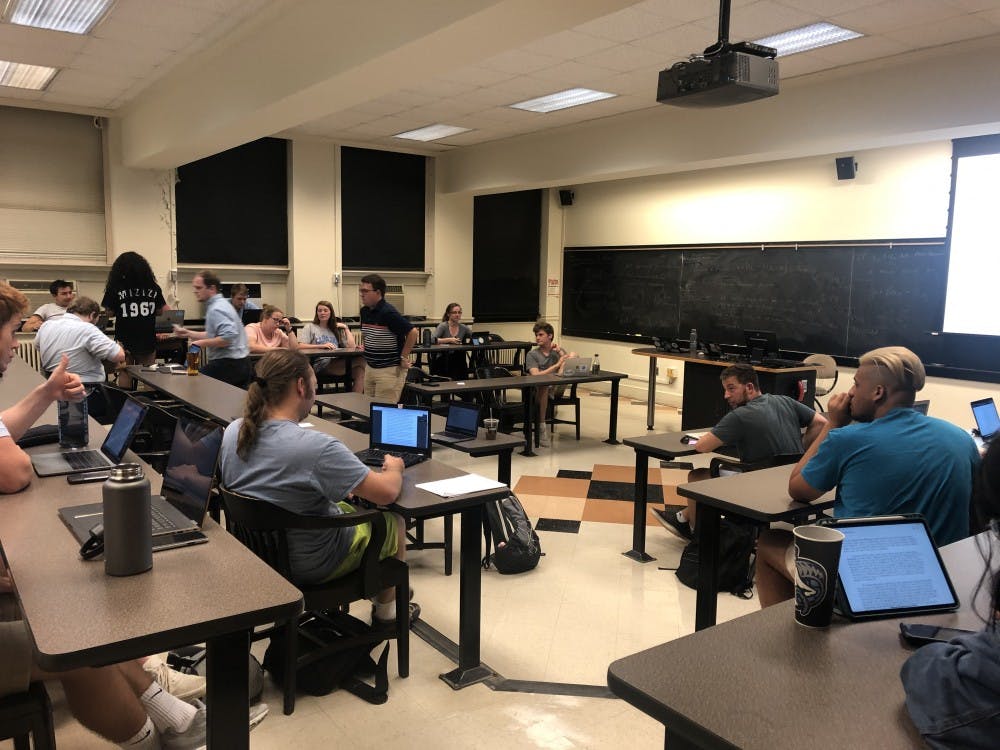The bill redefined a candidate support as a registered campaign worker — which candidates must supply a list of to the Board of Elections. Registered campaign workers are those who collect signatures, create promotional materials, conduct in-person campaign activities or serve as “digital evangelists.”
The reforms increased the amount of days to submit ballot petitions to the BOE. It also said the BOE should release the list of certified candidates three days earlier.
Student Body President Ashton Martin raised concerns over the longer campaign periods.
“Regarding extending possible campaigning, it’s pretty rough for those two weeks, but extending it even more might kill someone,” Martin said.
The reforms included the addition of an election monitor, who serves to detect election violations and file impartial complaints to the BOE. The monitors cannot be affiliated with a campaign or have previously served on a campaign or in student government. Monitors may also be paid.
“It gets rid of tattle-taling and petty back and forths,” Sen. Erik Beene, who also serves on The Daily Tar Heel's board of directors, said. “It makes our elections seem nicer and fairer.”
During last year’s student body president election, several election violation charges were filed against Martin’s opponents. The cases against one opponent, Jack Noble, were filed by three students associated with Martin's campaign.
"We never intended to get anyone disqualified, and I’m incredibly sympathetic to what he feels right now, I couldn’t imagine," Martin said at the time. "But I want to make it clear that we never had malicious intent."
Impeachment
Sen. Corry Dauderman filed a bill to impeach Henson, claiming that Henson violated a section of the student code that the Undergraduate Student Government cannot discriminate on the basis of national origin.
The allegations were based off Henson’s R&J report on October 1st.
“There were some demographic worries but felt that it would inhibit the committee’s progress more than develop it,” the report said.
To get the day's news and headlines in your inbox each morning, sign up for our email newsletters.
Henson was referring to the proportion of out-of-state to in-state students being appointed to the Student Advisory Committee to the Chancellor, who came before the R&J committee.
However, Dauderman claimed that discrimination based on national origin extended to “state, country or town of origin.”
“You can’t create two classes of students at Carolina,” Dauderman said.
Only one senator, Dauderman, voted “yes” to averment. This stopped the impeachment from moving forward.
This is not the first time Henson and Dauderman have clashed.
Dauderman said he began considering filing for impeachment when he read the report, and discussed it with the speaker after the address from Chancellor Kevin Guskiewicz.
At the previous full Senate meeting, Dauderman filed a motion to censure Henson — an official reprimand of a standing senator — believing it was inappropriate for Henson to cancel an R&J committee meeting. Henson, in turn, claimed he would file an ethics complaint against Dauderman.
“The fact that he tried to impeach me and not the rest of the entire committee who had the exact same concerns, tells you more about his motives than it does about anybody else's character,” Henson said.
Henson also said his concerns over the demographics of the appointees arose from Board of Governors policy itself, which mandates that 82 percent of incoming first-year classes must be from North Carolina.
An ethics investigation has been launched against Dauderman.
“(Henson) does have a large portion of the Senate with him,” Dauderman said. “I think a lot of people were confused as to what probable cause means. They saw it as a final statement.”
@ramishahmaruf_
university@dailytarheel.com



